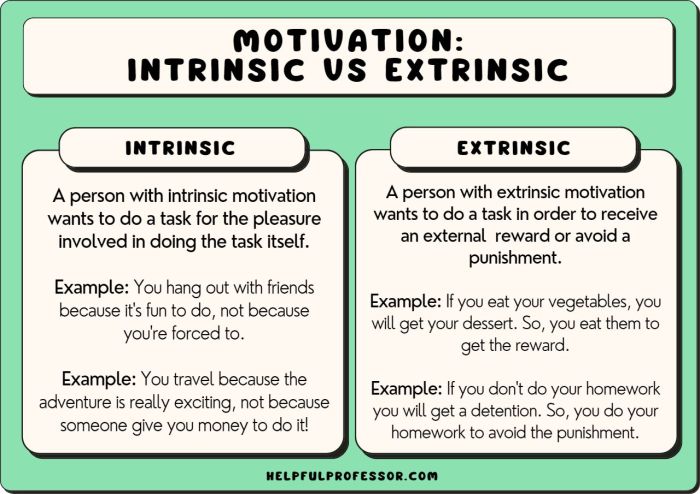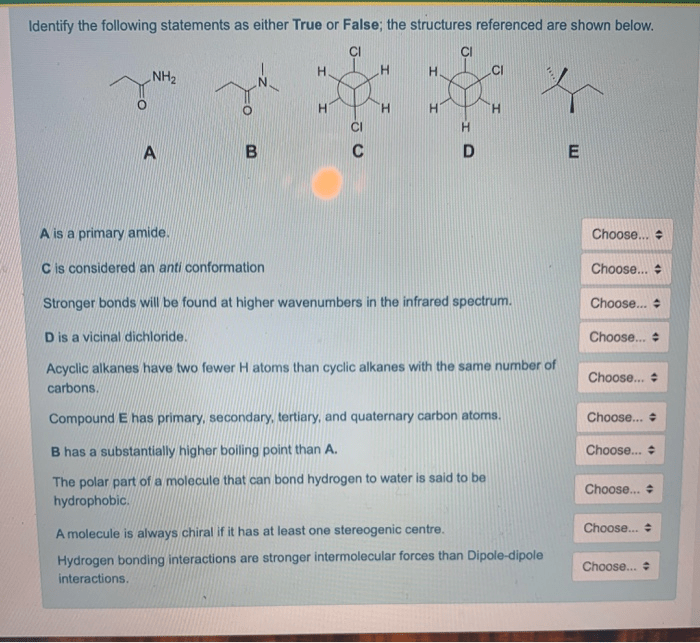Identify the true and false statements about intrinsic motivation. – Intrinsic motivation, a crucial concept in psychology, has sparked significant interest in understanding its true nature. This article aims to delve into the characteristics, benefits, and factors influencing intrinsic motivation, while also clarifying common misconceptions through a comprehensive table of true and false statements.
Intrinsic motivation, in contrast to extrinsic motivation, arises from within an individual, driven by personal interests, enjoyment, and a desire for mastery. Intrinsically motivated individuals exhibit distinct characteristics, such as autonomy, self-efficacy, and a growth mindset, which contribute to their persistent engagement in activities.
Definition of Intrinsic Motivation

Intrinsic motivation refers to the innate drive to engage in an activity for its own sake, without the expectation of external rewards or recognition. It arises from within the individual and is fueled by personal interests, curiosity, and a desire for growth.
Unlike extrinsic motivation, which is driven by external factors such as rewards or punishments, intrinsic motivation is self-directed and sustained by the inherent enjoyment or satisfaction derived from the activity itself.
Characteristics of Intrinsically Motivated Individuals

Individuals who are intrinsically motivated exhibit certain key characteristics that contribute to their behavior. These include:
- Curiosity and a desire to learn:Intrinsically motivated individuals are driven by a thirst for knowledge and a desire to explore and understand the world around them.
- Autonomy and self-direction:They prefer to work independently and set their own goals, rather than being directed by external forces.
- Challenge-seeking:They are not afraid of challenges and view them as opportunities for growth and development.
- Persistence and resilience:They are willing to work hard and overcome obstacles to achieve their goals.
- Focus and concentration:They are able to focus their attention on the task at hand and maintain their concentration for extended periods.
Benefits of Intrinsic Motivation: Identify The True And False Statements About Intrinsic Motivation.

Intrinsic motivation has numerous benefits for individuals and organizations. For individuals, it can lead to:
- Increased job satisfaction and engagement:Intrinsically motivated employees are more likely to be engaged in their work and find it meaningful.
- Improved performance and productivity:They are more likely to put forth extra effort and achieve higher levels of performance.
- Increased creativity and innovation:They are more likely to come up with new ideas and solutions to problems.
- Reduced stress and burnout:They are less likely to experience stress and burnout because they are not driven by external pressures.
For organizations, intrinsic motivation can lead to:
- Increased employee retention:Intrinsically motivated employees are more likely to stay with an organization because they find their work meaningful and satisfying.
- Improved organizational culture:Intrinsically motivated employees create a more positive and supportive work environment.
- Increased innovation and competitiveness:Intrinsically motivated employees are more likely to come up with new ideas and solutions that can help the organization succeed.
Factors that Influence Intrinsic Motivation

Several factors can influence intrinsic motivation, including:
- Personal interests and values:Individuals are more likely to be intrinsically motivated to engage in activities that align with their personal interests and values.
- Environmental factors:A supportive and encouraging environment can foster intrinsic motivation, while a negative or discouraging environment can stifle it.
- Task characteristics:Tasks that are challenging, novel, and meaningful are more likely to evoke intrinsic motivation than tasks that are routine, boring, or meaningless.
- Social factors:Positive relationships with colleagues and supervisors can also enhance intrinsic motivation.
Commonly Asked Questions
What is the key difference between intrinsic and extrinsic motivation?
Intrinsic motivation stems from internal factors, such as enjoyment and personal interest, while extrinsic motivation is driven by external rewards or punishments.
How does intrinsic motivation benefit individuals?
Intrinsic motivation enhances engagement, creativity, and a sense of accomplishment, leading to higher levels of satisfaction and well-being.
Can intrinsic motivation be influenced?
Yes, factors such as autonomy, challenge, and feedback can be manipulated to promote intrinsic motivation.